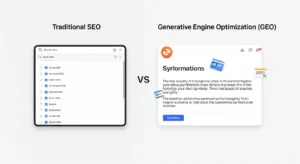Generative Engine Optimization (GEO): The next SEO frontier

Generative Engine Optimization (GEO): The Next SEO Frontier
For over two decades, the rules of the digital game have been clear: if you want to be found online, you must master Search Engine Optimization (SEO). You create great content, optimize your keywords, build backlinks, and climb the ladder of Google’s ten blue links. But today, that entire landscape is undergoing a seismic shift. The list of links is being replaced by a single, AI-generated answer.
We’ve all seen it. You search for a complex question, and instead of a list of websites, Google’s Search Generative Experience (SGE) or other AI-native engines like Perplexity provide a direct, conversational summary. This is a paradigm shift that demands a new approach. The old rules are no longer enough. To succeed in this new era, we need a new discipline: Generative Engine Optimization (GEO).
This guide will break down exactly what Generative Engine Optimization is, why it’s the next great frontier for digital content, and the core pillars you need to master to ensure you don’t get left behind.
Table of Contents
- What is Generative Engine Optimization (GEO)?
- Why Traditional SEO is No Longer Enough
- The 4 Core Pillars of Generative Engine Optimization
- The Future of Search: A Hybrid Approach
- Conclusion
What is Generative Engine Optimization (GEO)?
Generative Engine Optimization (GEO) is the practice of creating, structuring, and optimizing your content to be found, understood, and used by generative AI models to construct their answers.

Let’s break down the critical difference between SEO and GEO:
- Traditional SEO’s Goal: To rank your website link as high as possible on a search results page, encouraging a user to click through to your site.
- GEO’s Goal: To have your content’s information and expertise directly integrated into the AI’s generated answer, with your site cited as a trusted source.
The game is no longer just about winning the click; it’s about becoming the source of truth for the AI. This is the core mission of Generative Engine Optimization.
Why Traditional SEO is No Longer Enough
The rise of AI-powered answers is accelerating the trend of zero-click searches. This is where a user’s query is fully satisfied on the search results page itself, so they never need to click on a website. For many informational queries, the AI-generated summary is now “good enough.”
This means that even if your site ranks number one in the traditional sense, you could lose a significant portion of your traffic if the AI answer above it is comprehensive. Traditional SEO techniques like keyword density and backlink volume are still important signals, but they are becoming insufficient on their own. Generative engines are looking for something deeper: verifiable trustworthiness and unambiguous clarity. This is where the principles of Generative Engine Optimization become essential.
The 4 Core Pillars of Generative Engine Optimization
So, how do you optimize for an AI? The new rules of Generative Engine Optimization are built on a foundation of trust and clarity. Here are the four pillars you need to focus on.

1. Doubling Down on E-E-A-T
E-E-A-T—Experience, Expertise, Authoritativeness, and Trustworthiness—has been a cornerstone of Google’s quality guidelines for years, but it is now the single most important factor for GEO. An AI model is programmed to avoid risk; it cannot afford to give incorrect or harmful information. Therefore, it will heavily favor sources that demonstrate immense trust. According to Google’s documentation, these signals are paramount.
How to optimize for E-E-A-T:
- Author Bios: Clearly state who is writing your content and what their expertise is.
- About Us Page: Have a detailed page explaining your organization’s mission and history.
- Cite Sources: Link out to other authoritative studies, reports, and primary sources to back up your claims. This is a powerful trust signal.
2. Writing for Direct Answers
AI models are designed to find and deliver concise, factual answers to specific questions. To be included in their summaries, your content must be structured to provide these clear answers. This is a fundamental technique in Generative Engine Optimization.
How to write for direct answers:
- Use FAQ Pages: Create dedicated FAQ sections that ask and answer common questions in a straightforward way.
- Provide Clear Definitions: When introducing a concept, define it clearly and concisely in the first paragraph.
- Use Summaries and Bullet Points: Break down complex topics into scannable lists and key takeaways. An AI is more likely to pull from a clear bullet point list than a dense, narrative paragraph.
3. The Power of Structured Data (Schema Markup)
Structured data, or schema markup, is a standardized vocabulary of code that you add to your website’s HTML. It doesn’t change how your page looks to a human, but it gives search engines and AI models detailed context about your content. It’s like creating a “cheat sheet” for the AI.
How structured data helps GEO:
- It can explicitly tell an AI: “This is a product review,” “This is a recipe with these ingredients,” or “This is an article written by this specific expert.”
- This removes ambiguity and helps the AI trust your information, making it more likely to be used in a generative answer. The correct use of schema is a technical cornerstone of Generative Engine Optimization.
4. Building Topical Authority and Citing Sources
An AI is more likely to trust a source that has demonstrated deep expertise across a specific topic, not just in a single article. This is known as topical authority. Leading publications like Search Engine Land have noted that being a specialized expert is increasingly important in the age of SGE.
How to build topical authority:
- Create Content Clusters: Instead of writing one article on a topic, create a “cluster” of interconnected articles that cover every aspect of that subject.
- Be Comprehensive: Aim to create the single best, most detailed resource on a given subject.
- Cite Sources: Just as in academic writing, citing your sources shows that your work is well-researched and trustworthy. This is a critical practice for effective Generative Engine Optimization.
The Future of Search: A Hybrid Approach

Traditional SEO is not dead. Backlinks, mobile-friendliness, and site speed still matter. However, Generative Engine Optimization (GEO) is now a mandatory second layer of strategy. The future of search will require a hybrid approach: you still need to convince the algorithm to rank your page, but now you also need to convince the AI to trust your information.
Winning in this new era means adopting both disciplines. SEO gets you seen. GEO gets you cited. Together, they help you stay competitive in a changing digital ecosystem.
Conclusion
The shift from a list of links to a direct, AI-generated answer is the most significant change to search in a generation. While it presents a challenge to traditional SEO, it also offers a massive opportunity for those who are willing to adapt.
The core principles of Generative Engine Optimization—building trust, demonstrating expertise, and providing clear, well-structured information—are ultimately aligned with the best practices for creating high-quality, user-focused content.
The game has changed from simply winning the click to becoming the source of truth. GEO is the discipline that will define the winners and losers in this new SEO frontier.
For more deep dives into the future of tech and digital strategy, explore the articles and guides at techpastel.com.




